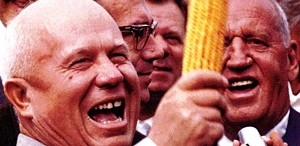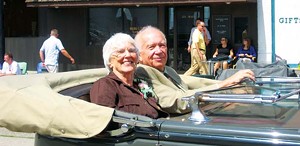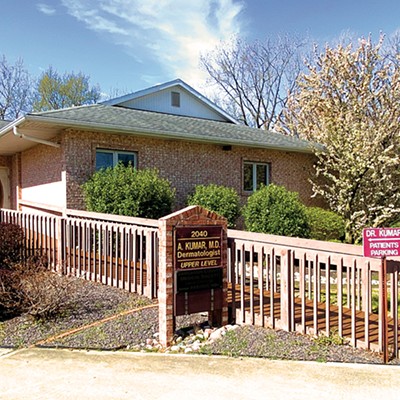Fifty years later, celebrating diplomacy on an Iowa farm
[
{
"name": "Air - MedRect Combo - Inline Content 1",
"component": "11490391",
"insertPoint": "3",
"requiredCountToDisplay": "1",
"parentWrapperClass": "fdn-ads-inline-content-block"
},{
"name": "Air - MedRect Combo - Inline Content 2",
"component": "11490392",
"insertPoint": "7",
"requiredCountToDisplay": "5",
"parentWrapperClass": "fdn-ads-inline-content-block"
},{
"name": "Air - MedRect Combo - Inline Content 3",
"component": "11490393",
"insertPoint": "12",
"requiredCountToDisplay": "9",
"parentWrapperClass": "fdn-ads-inline-content-block"
}
]
The menu served to Soviet Premier Nikita Khrushchev and U.S. farmer-business man Roswell Garst in 1959 at Hotel Fort Des Moines was served again at the hotel last Friday, Aug. 28: split pea soup, celery hearts, ripe and green olives, roast prime rib of Iowa corn-fed beef, baked russet potato with sour cream, buttered green lima beans, mixed summer greens salad with Hotel Fort Des Moines dressing, hard rolls, rye bread, latticed top fresh peach pie with whipped cream, wine and coffee. But this year’s banquet was emceed by former U.S. Ambassador Kenneth Quinn, president of the World Food Prize foundation, and speakers included U.S. Secretary of Agriculture Tom Vilsack, and Dr. Sergei Khrushchev, elderly son of the late premier.
The 50th anniversary banquet on Friday capped a conference, held earlier in the day, titled “Khrushchev in Iowa . . . celebrating Agriculture’s Contribution to International Understanding.” Panel discussions included: “Feeding a Hungry World: Agricultural Progress, Productivity and Sustainability” and “Citizen Diplomacy in U.S.-Russian Relations.”
On Saturday morning, the delegation of about 20 Russian government and business leaders, crews from Russian and U.S. TV stations, and other reporters traveled from Des Moines to the Roswell and Elizabeth Garst farm in Coon Rapids, Iowa.
Garst was an indefatigable farmer and fearless corn-seed salesman who believed that U.S. agricultural innovations including hybridization could answer problems of world hunger. Nikita Khrushchev’s son, Sergei, was 24 years old when he accompanied his father to the farm in 1959. Professor Khrushchev, now a senior fellow at Brown University in Rhode Island and a U.S. citizen, was warmly greeted by dozens of Garst descendants and some 150 local folks and other guests invited to the unveiling of the official plaque identifying the Garst farm as a historic site.
On Aug. 12 this year the 5,400 acre farm, was listed on the National Register of Historic Places because it “is associated with events that have made a significant contribution to the broad patterns of history,” contributing to positive U.S.-Russian relations and trade, in spite of the deep divide evident in Cold War policies and the Iron Curtain imagery.
The friendship between Khrushchev and Garst leading up to the September 1959 farm visit was cited several times during the conference as helping to “drill a hole” through the Iron Curtain. Subsequent trade exchanges alleviating food shortages in the Soviet Union and bolstering U.S. sales of seed, heavy farm equipment and related products was seen as averting worsening relations between the two superpowers. Some at the reunion said that World War III was avoided, due in some degree to Garst’s citizen diplomacy.
Reflecting the international tensions of 1959, several hundred National Guardsmen reportedly lined the 70 miles of highway from Des Moines to the Garst Farm. Fifty years later, only two state police officers were present at the farm to direct local traffic flow.
Make no mistake, said one Garst granddaughter, Roswell Garst was a capitalist interested in making a profit. At the same time, he is quoted as saying “a hungry people are a dangerous people.” Khrushchev’s motivation, on the other hand, was to show Soviet citizens that Western ideas could have merit and should be tried. The recent reunion recalled how the decades of fear and denunciation, of breath-holding international incidents involving Soviet missiles being shipped to Cuba and a U.S. spy plane shot down over the Soviet Union, were balanced against a personal friendship between ardent Communist Nikita Khruschev and staunch Democrat Roswell Garst. This past weekend demonstrated that friendship won.
Yosh Golden is a writer and local business owner. She has written articles for Illinois Times about the experiences of Japanese-Americans, in particular her family, sent to U.S. concentration camps. She is mother-in-law of Amy Garst Lee, granddaughter of Roswell Garst.
The 50th anniversary banquet on Friday capped a conference, held earlier in the day, titled “Khrushchev in Iowa . . . celebrating Agriculture’s Contribution to International Understanding.” Panel discussions included: “Feeding a Hungry World: Agricultural Progress, Productivity and Sustainability” and “Citizen Diplomacy in U.S.-Russian Relations.”
On Saturday morning, the delegation of about 20 Russian government and business leaders, crews from Russian and U.S. TV stations, and other reporters traveled from Des Moines to the Roswell and Elizabeth Garst farm in Coon Rapids, Iowa.
Garst was an indefatigable farmer and fearless corn-seed salesman who believed that U.S. agricultural innovations including hybridization could answer problems of world hunger. Nikita Khrushchev’s son, Sergei, was 24 years old when he accompanied his father to the farm in 1959. Professor Khrushchev, now a senior fellow at Brown University in Rhode Island and a U.S. citizen, was warmly greeted by dozens of Garst descendants and some 150 local folks and other guests invited to the unveiling of the official plaque identifying the Garst farm as a historic site.
On Aug. 12 this year the 5,400 acre farm, was listed on the National Register of Historic Places because it “is associated with events that have made a significant contribution to the broad patterns of history,” contributing to positive U.S.-Russian relations and trade, in spite of the deep divide evident in Cold War policies and the Iron Curtain imagery.
The friendship between Khrushchev and Garst leading up to the September 1959 farm visit was cited several times during the conference as helping to “drill a hole” through the Iron Curtain. Subsequent trade exchanges alleviating food shortages in the Soviet Union and bolstering U.S. sales of seed, heavy farm equipment and related products was seen as averting worsening relations between the two superpowers. Some at the reunion said that World War III was avoided, due in some degree to Garst’s citizen diplomacy.
Reflecting the international tensions of 1959, several hundred National Guardsmen reportedly lined the 70 miles of highway from Des Moines to the Garst Farm. Fifty years later, only two state police officers were present at the farm to direct local traffic flow.
Make no mistake, said one Garst granddaughter, Roswell Garst was a capitalist interested in making a profit. At the same time, he is quoted as saying “a hungry people are a dangerous people.” Khrushchev’s motivation, on the other hand, was to show Soviet citizens that Western ideas could have merit and should be tried. The recent reunion recalled how the decades of fear and denunciation, of breath-holding international incidents involving Soviet missiles being shipped to Cuba and a U.S. spy plane shot down over the Soviet Union, were balanced against a personal friendship between ardent Communist Nikita Khruschev and staunch Democrat Roswell Garst. This past weekend demonstrated that friendship won.
Yosh Golden is a writer and local business owner. She has written articles for Illinois Times about the experiences of Japanese-Americans, in particular her family, sent to U.S. concentration camps. She is mother-in-law of Amy Garst Lee, granddaughter of Roswell Garst.
Illinois Times has provided readers with independent journalism for almost 50 years, from news and politics to arts and culture.
Your support will help cover the costs of editorial content published each week. Without local news organizations, we would be less informed about the issues that affect our community..
Got something to say?
Send a letter to the editor and we'll publish your feedback in print!



















